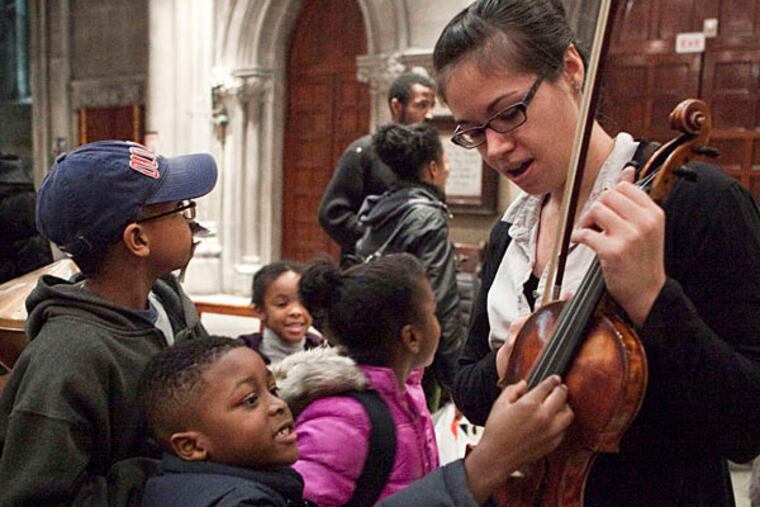The little orchestra that leads itself
Great music isn't a stranger to the Church of the Advocate on Diamond Street in the urban frontier of North Philadelphia.

Great music isn't a stranger to the Church of the Advocate on Diamond Street in the urban frontier of North Philadelphia.
Just inside the French Gothic sanctuary, a large greenish angel points its trumpet heavenward. And only a few feet beyond that, on certain nights, stands the Prometheus Chamber Orchestra, in one of its regular season of free concerts - the second season concludes on Saturday - with hardly any budget and, what's more significant, no conductor.
"It saves on overhead," says bassist Jerrell Jackson with subtle, smart-aleck irony. More seriously, being a conductorless ensemble places greater responsibility on individuals, who have to watch and listen to each other more closely - one reason why most members stand while performing.
"The days are gone when you could just hole up in your practice room and see what the conductor has to tell us," says cofounder Vena Johnson, a violinist.
"You take away the safety net," says Jackson, also a cofounder, "but it's [also] more exciting for the audience because there's not a conductor in front of them telling you how to react."
Nets do have their place here: In the singularly beautiful 1887 sanctuary with European-style chairs rather than pews, black netting hangs beneath the ceiling to protect people from falling plaster. But there may be an acoustical advantage there: The rich, warm sound gives the 18-member orchestra extra muscle without the diffusion heard in many churches.
Less advantageous are the wintertime heating bills that require special fund-raising efforts to keep the temperature comfortable. Sometimes the chill forces the orchestra to play in the church's gymnasium.
Nobody is paid in this self-run organization of mostly twentysomething Temple University graduates, whose day jobs generally involve teaching. During the group's customary encore, the hat is passed among the audience of 120 or so, and the proceeds can be as high as $1,000. A wine-and-cheese reception follows.
The concerts themselves aren't necessarily all that different in manner or content. But the reasons behind everything, even playing something as standard as Mozart's Eine Kleine Nachtmusik, as will happen Saturday, reflects what might be called millennial realism, based on where the music is played and how it's presented.
"There's this disconnect between what the art means to us and how that translates into the community," said Johnson. "Many people just aren't reached. It's not necessarily economic - if the art isn't speaking to a society for what we're going through, then it won't translate."
What translates is often a surprise. When the orchestra previewed Philip Glass' String Quartet No. 5 for the Advocate Cafe, the church's soup kitchen, the response was terrific. Then again, the environment isn't typical. "We don't call it a soup kitchen," said Lynn Buggage, the parish administrator. "We serve a plate of food. People hang around and talk about politics."
Rehearsals are often open to the public, and in a group where everybody has his or her say, there's a certain entertainment value to that. Rules are necessary to keep things from falling into a free-for-all. Each concert has a curator, who moderates among the players; they are encouraged to limit themselves to two comments per rehearsal.
Violinist Russell Kotcher was on thin ice at a recent rehearsal: "I said about five things," he said, "but there's flexibility there. When I really want to say something, I voice my opinion." On a good day, a non-participating musician sits apart from the group, score in hand, acting as a sounding board. The process takes longer, which is one reason Prometheus has six rehearsals per concert, compared with Chamber Orchestra of Philadelphia's three.
It's a distinctive bunch. When Jackson first discussed the idea of the ensemble with his mother, she told him a key factor would be finding the right team. "She said it can't happen without people who are as passionate as you are."
The members joke that the orchestra was formed in the spirit of the movie Ocean's 11: This one knew that one and one thing led to another. Actually, formal letters were sent out to like-minded contacts.
Models were many: The music world is increasingly populated with small, agile, revisionist-minded chamber groups from the East Coast Chamber Orchestra to the Knights. The name Prometheus reflects a fiery sense of independence. The group isn't sure it even wants a board, if only to keep non-musicians from making artistic decisions.
The church's location, at 18th and Diamond Streets, is tricky. Chamber Orchestra of Philadelphia played several seasons five blocks away at the Temple Performing Arts Center and drew tiny audiences. The neighborhood around the Advocate is more economically depressed. Yet Prometheus' 120 or so listeners showed up on some of last winter's coldest nights, thanks partly to social media but also because of the Advocate's own low-tech marketing, which includes knocking on doors with postcards.
Prometheus members have hopes of expanding, though the group feels as much a part of the church as the trumpeting angel. "It has fed our energy, that space," says Johnson.
What happens when they're older, with children in their lives and a need to support them? That has already started in their ranks. The hope is that the orchestra will grow to the point where it is a living. But until then? "We endure," said violinist Angela Sulzer.
Said violist Veronica Jurkiewicz, "We all make it happen somehow."
FREE CONCERT
Prometheus
8 p.m. Saturday, the Church of the Advocate, 1801 Diamond St. Free. Information: www.prometheusorchestra.org/facebookEndText